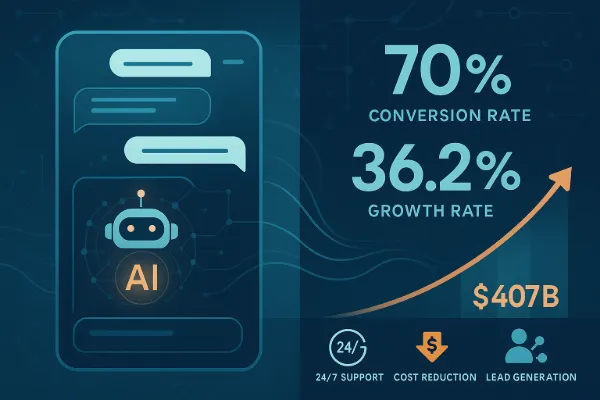
Automation to Elevate Your Small Business
Let's put your growth on autopilot
WEBSITE
DESIGN
REPUTATION
MANAGEMENT
SOCIAL MEDIA
ADVERTISING
SEO
SERVICES
LET'S TALK

A Guide to Implementing AI Chatbots in 2025
The Rise of AI Chatbots in Small Business
In today's digital landscape, small businesses are constantly seeking innovative ways to enhance customer engagement and drive conversions. Among the most powerful tools emerging in this space are AI chatbots, which are revolutionizing how businesses interact with their website visitors. According to recent statistics, the global AI market is expected to reach $407 billion by 2027, with an impressive annual growth rate of 36.2%.
Why Small Businesses Should Consider AI Chatbots
The data supporting AI chatbot implementation is compelling. According to recent studies, 60% of business owners report that chatbots improve lead generation and conversion rates. Even more impressively, some sectors have witnessed conversion rates as high as 70% through chatbot interactions, with business leaders reporting a 67% increase in sales through these AI-powered assistants.
Key Benefits for Small Businesses:
- 24/7 Customer Support Availability
- Reduced Operational Costs (up to 30% in customer service)
- Improved Lead Generation
- Enhanced Customer Experience
- Automated Routine Tasks
Best Practices for Implementing AI Chatbots
1. Define Clear Objectives
Before implementing a chatbot, establish specific goals for what you want to achieve. Whether it's increasing sales, improving customer service, or generating leads, having clear objectives will guide your implementation strategy.
2. Start Small and Scale
Begin with basic functionalities focused on your most common customer interactions. This approach allows you to test, learn, and refine before expanding to more complex applications.
3. Personalize the Experience
Configure your chatbot to provide personalized responses based on user behavior and previous interactions. According to recent data, 26% of all sales transactions now start from a bot interaction, highlighting the importance of personalization in the conversion process.
Implementation Steps for Success
1. Choose the Right Platform
Select a chatbot platform that aligns with your business needs, technical capabilities, and budget. Many platforms now offer no-code solutions, making it accessible for small businesses without technical expertise.
2. Design Conversational Flows
Create natural, engaging conversation paths that guide users toward desired actions. Focus on:
- Clear and concise messaging
- Logical conversation flow
- Easy navigation options
- Clear calls-to-action
3. Test and Optimize
Regularly monitor chatbot performance and gather user feedback to improve effectiveness. Pay attention to:
- Conversation completion rates
- User satisfaction levels
- Conversion metrics
- Common drop-off points
Measuring Success and ROI
Track key performance indicators (KPIs) to measure the impact of your chatbot implementation. According to industry data, 35% of business leaders credit digital assistants for helping close deals. Focus on metrics such as:
- Conversion rate improvements
- Customer satisfaction scores
- Response time reduction
- Cost savings in customer service
Future Trends and Considerations
As AI technology continues to evolve, chatbots are becoming increasingly sophisticated. Recent trends indicate that nearly three in five small businesses are either already using or planning to implement AI in the next two years. Future developments will likely include:
- Enhanced predictive analytics capabilities
- More natural language processing
- Better integration with other business systems
- Improved personalization features
Conclusion
Implementing AI chatbots on your small business website is no longer a luxury—it's becoming a necessity for staying competitive in today's digital marketplace. With the potential to significantly boost conversions, improve customer service, and reduce operational costs, chatbots offer a compelling return on investment for small businesses ready to embrace this technology.
Start small, focus on solving specific customer problems, and continuously refine your chatbot based on performance data and user feedback. With the right approach, AI chatbots can become a powerful tool in your digital marketing arsenal, helping to drive growth and improve customer satisfaction.
Copyright 2025 - Dean Technology LLC
